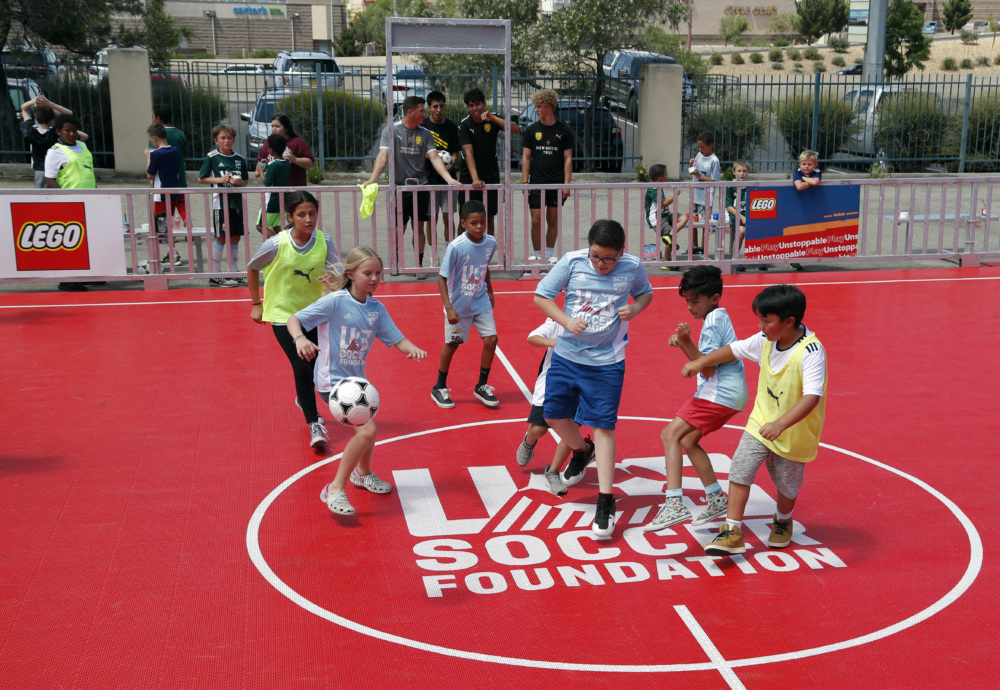

Let soccer do what soccer does.
Together, we can give millions of kids from underserved communities safe places to grow, thrive and build confidence for life.
Someone Like You
According to the Women’s Sports Foundation, more than 38% of U.S. girls – compared to 25% of boys – don’t participate in sports. By age 14, girls are two times more likely to drop out of sports than boys. These disparities persist as girls enter high school. For children between eighth and twelfth grade, female attrition rates reach -51% versus -31% for boys.
Lack of female representation in sports also extends to coaching. Only 22.5% of the nation’s youth coaches are female. At the intercollegiate level, the percentage of females coaching women’s teams has fallen from 90% in 1972 to roughly 43% in 2014. Coaches often serve as mentors at impressionable stages of athletes lives and these gaps leave many young women without role models who may share similar experiences.
Some postulate that the lower rate of female youth sports participation is correlated to a lack of opportunity, social norms, young girls not having fun, or a scarcity of role models. In Detroit, Soccer for Success partner, Detroit PAL, has sought to change the narrative by taking action on what they believe to be a key determinant of keeping girls in the game: increasing the number of female coach-mentors.

The organization has been seeing results with a participant ratio breakdown of 59% male to 41% female. Their ratio of male to female coach-mentors is also significant: almost half of the organization’s coach-mentors are female.
Detroit PAL’s hope is that the parity of male to female coach-mentors encourages more young women to participate in the program. “When you get these teachers and these young ladies that want to make an impact on youth and you get them into a gym, into a safe place to play, that attracts other women,” says Soccer for Success program manager at Detroit PAL, Mikyle Covington, “because they want to be around female mentors that look like them and act like them and talk like them.”
Samantha, a kindergarten teacher and Soccer for Success program coordinator at Hamilton Academy, agrees. Having been a coach-mentor for the last four years, she has come to learn first-hand how important it is for students to be able to connect with their coaches. “A lot of the girls always ask who their coach is going to be,” Samantha says. “They’re trying to fish out if they want to participate, will they feel comfortable. Just having a female coach allows the girls to see themselves playing the sport. It’s less intimidating for them and for some of the girls who are aren’t athletic, they decide to just give it a try.”

First-year Soccer for Success coach-mentor, Erica, who teaches and coaches second grade students at Hamilton Academy, has seen how her role as a coach and a mentor has allowed her to develop meaningful relationships with her students. “There are so many girls on the team…and they feel like they can go to us,” she says. “Because we’ve developed a relationship on the field, they do come up to me in the hallway and if they need anything, they know that they can ask me. Developing and strengthening those relationships this past year has been really exciting and I think it will bring a different tone [next season].”
That relationship has even trickled down to the players, who often compete with students of all ages during their Soccer for Success practices. Aniyah, for example, has only been playing soccer for one year, but says that one of her favorite parts of soccer is being able to teach younger players different skills. “I like being on the little kids’ team because I get to help them learn how to play and they get to watch the moves we’re supposed to be doing,” she says.
Sixth-grader Johnnese also likes “playing with the other people that go to school and teaching other people how to play.”
At Hamilton Academy, Samantha has noticed that young girls have become confident in their abilities. “At recess, they want to play soccer. They’re more comfortable. They’re more sure of themselves playing sports.”
As the Detroit PAL Soccer for Success community continues to grow, their hope is that more and more women feel empowered to not only participate in soccer, but also continue to create safe and supportive places to play.
Soccer for Success partner, Detroit PAL, identified and put into practice a new method to get more girls and female coach-mentors in the game. Learn more about the work the U.S. Soccer Foundation is doing with its partners to increase female participation in the sport.
